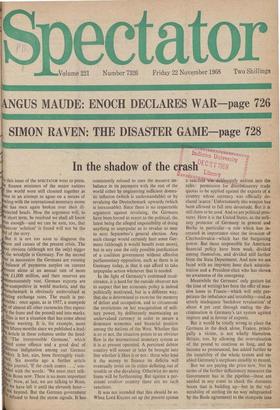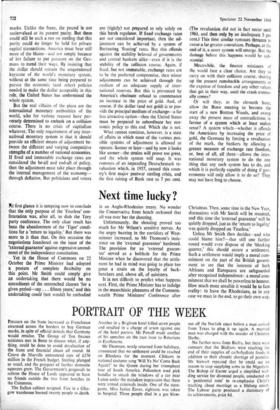xeuivx otyolonoxxo x ., rn di an verc ty o f the eras DEc2,77968
In the shadow o •
h Library ks this issue of the SPBCTATOR went to press, he finance ministers of the major nations the world were still closeted together at onn in an attempt to agree on a means of eating with the international monetary storm at has once again broken over their ill- tected heads. How the argument will, in short term, be resolved we shall all know on enough—and we can be sure, too, that atever 'solution' is found will not be the of the story.
ut it is not too soon to diagnose the re and causes of the present crisis. The t obvious (although not the only) nigger he woodpile is Germany. For the second in succession the Germans are running alance of payments surplus on current unt alone at an annual rate of more £1,000 million, and their reserves are ensurately vast. German exports are -competitive in world markets, and the tschemark is obviously undervalued at ng exchange rates. The result is pre- hie : once again, as in 1957, a stampede of almost all other currencies (but especi- the franc and the pound) and into marks. is is not a situation that has come about out warning. It is, for example, more fifteen months since we published a lead- article in these columns under the head- `The irresponsible Germans,' which used some offence and a good deal of .thteuus indignation among our German t`4ders , It has, alas, been thoroughly vindi- ihted. Six months ti ago a further article this journal, 'If the crash comes . . con- illtided with the words : 'We must start talk- to Bonn now. There is no more important Now, at last, we are talking to Bonn. at We have left it until the eleventh hour- 11411°I, beyond. But the German government 4 refused to heed the storm signals. It has consistently refused to cure the massive im- balance in its payments with the rest of the world either by engineering sufficient domes- tic inflation (which is understandable) or by revaluing the Deutschemark upwards (which is inexcusable). Since there is no respectable argument against revaluing, the Germans have been forced to resort to the political, the latest being the alleged impossibility of doing anything so unpopular as to revalue so near to next September's general election. Any such change would certainly hurt some Ger- mans (although it would benefit even more), but in any case the only possible justification of a coalition government without effective parliamentary opposition, such as there is in Germany today, is that it can afford to take unpopular action whenever that is needed.
In the light of Germany's continued recal- citrance, it is hard for the outside observer not to suspect that her economic policy is indeed politically motivated, but in a different way; that she is determined to exorcise the memory of defeat and occupation, and to circumvent the restrictions on her reacquisition of mili- tary power, by deliberately maintaining an undervalued currency in order to secure a dominant economic and financial position among the nations of the West. Whether this is so or not, the situation points to an obvious flaw in the international monetary system as it is at present operated. A persistent debtor country will sooner or later be brought into line whether it likes it or not : those who lend it the money to finance its deficits will eventually insist on its either deflating out of trouble or else devaluing. Otherwise no more loans will be forthcoming. But against a per- sistent creditor country there are no such sanctions.
It was not intended that this should be so. When Lord Keynes set up the present system a sane ilgtitxftwdelAlitg. wcely written into the rules : permission for discriminatory trade quotas to be applied against the exports of a country whose currency was officially de- clared 'scarce.' Unfortunately this weapon has been allowed to fall into desuetude. But it is still there to be used. And so are political pres- sures. Here it is the United States, as the mili- tary protector of Germany in general and Berlin in particular—a role which has in- creased in importance since the invasion of Czechoslovakia—which has the bargaining power. But those responsible for American financial policy have been weak, divided among themselves, and divided still further from the State Department. And now we are faced with an impotent lame duck adminis- tration and a President-elect who has shown no awareness of the emergency.
Meanwhile the Germans' only gesture (at the time of writing) has been the offer of mas- sive loans to France—which will only per- petuate the imbalance and instability—and an utterly inadequate 'backdoor revaluation' of about 4 per cent through ending the dis- crimination in Germany's tax system against imports and in favour of exports.
But it would be totally wrong to place the Germans in the dock alone. France, princi- pally a victim, is not wholly blameless. Britain, too, by allowing the overvaluation of the pound to continue so long, and to become so pronounced, has added further to the instability of the whole system and en- abled Germany's surpluses steadily to mount. marks. Unlike the franc, the pound is not undervalued at its present parity. But there could still be such a run on sterling that this parity could no longer be held for private capital transactions. America must bear still more of the blame—and not simply because of her failure to put pressure on the Ger- mans to mend their ways. By insisting that the dollar should remain the unquestioned keystone of the world's monetary system, without at the same time being prepared to pursue the economic (and other) policies needed to make the dollar acceptable in this role, the United States has undermined the whole system.
But the real villains of the piece are the international monetary authorities of the world, who for various reasons have per- versely determined to embark on a collision course. There is no crisis of capitalism whatever. The only requirement of any inter- national Monetary system is that it should provide an efficient means of adjustment be- tween the different and varying competitive AMOS Of a number of national economies. If fixed and immutable exchange rates are considered the be-all and end-all of policy, then the adjustment must take place through the internal management of the economy— through deflation. But politicians and voters are (rightly) not prepared to rely solely on this harsh regulator. If fixed exchange rates are not considered important, then the ad- justment can be achieved by a system of fluctuating 'floating' rates. But this offends against the stability beloved of governments and central bankers alike—even if it is the stability of the collision course. Again, if fixed, but not immutable, exchange rates are to be the preferred compromise, then minor adjustments can be achieved through the cushion of an adequate supply of inter- national reserves. But this is prevented by America's obstinate refusal to countenance an increase in the price of gold. And, of course, if the dollar (and not gold) is to pro- vide the principal medium of exchange—a far less attractive option—then the United States must be prepared to subordinate her eco- nomic policy to this end. Which she is not.
What cannot continue, however, is a state of affairs in which none of the various pos- sible systems of adjustment is allowed to operate. Sooner or later—and by now it looks like sooner—the strains will prove too great, and the whole system will snap. It was rumours of an impending Deutschemark re- valuation which, in 1957, caused this coun- try's first major postwar sterling crisis, and the first raising of Bank rate to 7 per cent. (The revaluation did not in fact occur until 1961, and then only by an inadequate 5 per cent.) This time similar rumours threaten to cause a far greater convulsion. Perhaps, at the end of it, a saner system will emerge. But the damage before this happens would be sub- stantial.
Meanwhile, the finance ministers of the world face a clear choice. Are they to carry on with their collision course, shoring up the present ramshackle arrangements at the expense of freedom and any other values that get in their way, until the crash eventu- ally comes?
Or will they, at the eleventh hour, allow the Bonn meeting to become the start of a new Bretton Woods, and sweep away the present mass of contradictions in favous of a system which at least makes sense? A system which—whether it offends the Americans by increasing the price of gold, the Germans by forcing a revaluation of the mark, the bankers by allowing a greater measure of exchange rate freedom, or, best of all, all three—allows the inter- national monetary system to do the one thing that any such system has to do, and which it is perfectly capable of doing if gov- ernments will only allow it to do so? They may not have Ibng to choose.



































